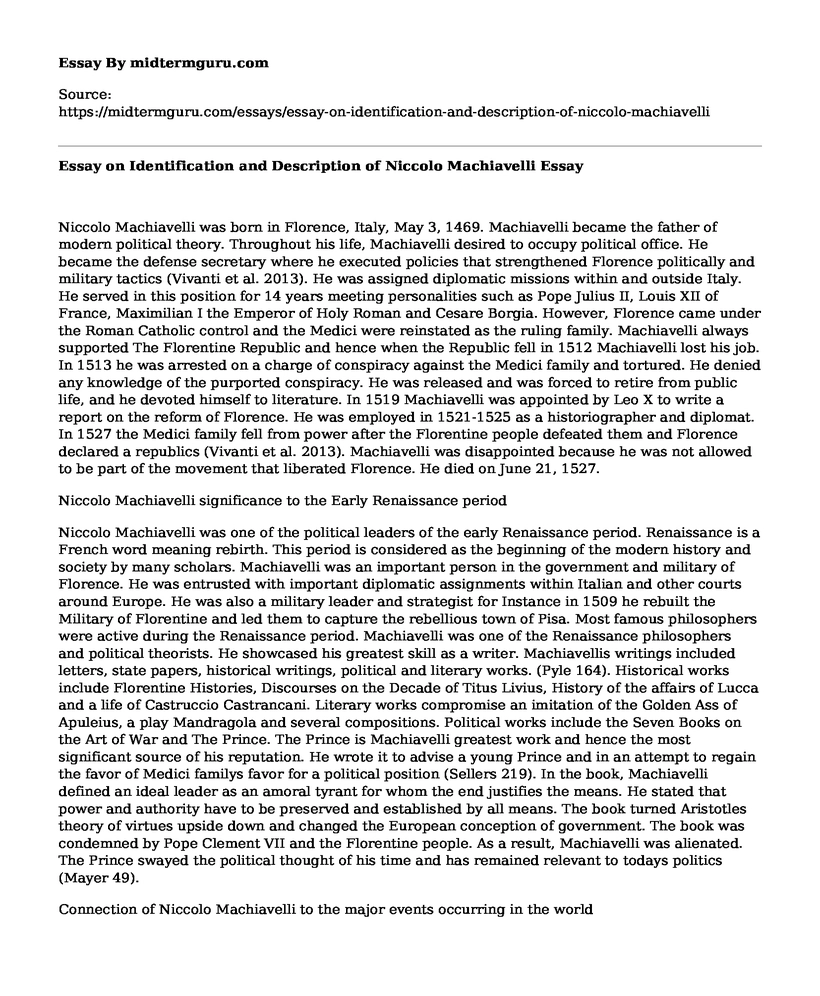Niccolo Machiavelli was born in Florence, Italy, May 3, 1469. Machiavelli became the father of modern political theory. Throughout his life, Machiavelli desired to occupy political office. He became the defense secretary where he executed policies that strengthened Florence politically and military tactics (Vivanti et al. 2013). He was assigned diplomatic missions within and outside Italy. He served in this position for 14 years meeting personalities such as Pope Julius II, Louis XII of France, Maximilian I the Emperor of Holy Roman and Cesare Borgia. However, Florence came under the Roman Catholic control and the Medici were reinstated as the ruling family. Machiavelli always supported The Florentine Republic and hence when the Republic fell in 1512 Machiavelli lost his job. In 1513 he was arrested on a charge of conspiracy against the Medici family and tortured. He denied any knowledge of the purported conspiracy. He was released and was forced to retire from public life, and he devoted himself to literature. In 1519 Machiavelli was appointed by Leo X to write a report on the reform of Florence. He was employed in 1521-1525 as a historiographer and diplomat. In 1527 the Medici family fell from power after the Florentine people defeated them and Florence declared a republics (Vivanti et al. 2013). Machiavelli was disappointed because he was not allowed to be part of the movement that liberated Florence. He died on June 21, 1527.
Niccolo Machiavelli significance to the Early Renaissance period
Niccolo Machiavelli was one of the political leaders of the early Renaissance period. Renaissance is a French word meaning rebirth. This period is considered as the beginning of the modern history and society by many scholars. Machiavelli was an important person in the government and military of Florence. He was entrusted with important diplomatic assignments within Italian and other courts around Europe. He was also a military leader and strategist for Instance in 1509 he rebuilt the Military of Florentine and led them to capture the rebellious town of Pisa. Most famous philosophers were active during the Renaissance period. Machiavelli was one of the Renaissance philosophers and political theorists. He showcased his greatest skill as a writer. Machiavellis writings included letters, state papers, historical writings, political and literary works. (Pyle 164). Historical works include Florentine Histories, Discourses on the Decade of Titus Livius, History of the affairs of Lucca and a life of Castruccio Castrancani. Literary works compromise an imitation of the Golden Ass of Apuleius, a play Mandragola and several compositions. Political works include the Seven Books on the Art of War and The Prince. The Prince is Machiavelli greatest work and hence the most significant source of his reputation. He wrote it to advise a young Prince and in an attempt to regain the favor of Medici familys favor for a political position (Sellers 219). In the book, Machiavelli defined an ideal leader as an amoral tyrant for whom the end justifies the means. He stated that power and authority have to be preserved and established by all means. The book turned Aristotles theory of virtues upside down and changed the European conception of government. The book was condemned by Pope Clement VII and the Florentine people. As a result, Machiavelli was alienated. The Prince swayed the political thought of his time and has remained relevant to todays politics (Mayer 49).
Connection of Niccolo Machiavelli to the major events occurring in the world
Due to the importance of The Prince to politics Machiavelli is considered the father of the modern political thought. He has had a significant influence on our modern societies and civilization. His ideas and opinions on political leaders and governments should handle power affected how future leaders would run their spheres of influence (Rojek 457). Many historians may maintain that the likes of Michelangelo or Leonardo Da Vinci were the greatest reformation era thinkers and had the most significant impact. But Machiavelli had the biggest impact on the modern western civilization than any other Renaissance writer, artists, and philosophers. This is because he was able to examine the human society and functions to the extent that he changed the philosophy of a discipline (Political Science) and changed the way politics works globally (Rojek 458). His opinions on how to operate the government was a political reality rather than work based on theory. He recognized the existence of power politics and a result he changed the way we view government and how it is run. Machiavellis innovative writing style made him a famous writer of the Renaissance leader. His play Mandragola is always categorized as one of the most well written Italian (Pyle 165). Machiavellis influence on the Renaissance period and the modern civilization cannot be matched by any other individual of his era.
References
Mayer, Jeffrey L. "Niccolos Lesson: Machiavellis Advice to Policy Advisors." Public Voices 14.2 (2017): 43-54.
Pyle, Cynthia M. "Scientific and applied Renaissance humanism." Intellectual History Review 26.1 (2016): 163-169.
Rojek, Chris. "Niccolo Machiavelli, cultural intermediaries and the category of achieved celebrity." Celebrity studies 5.4 (2014): 455-468.
Sellers, Mortimer NS. "Niccolo Machiavelli: Father of Modern Constitutionalism." Ratio Juris 28.2 (2015): 216-225.
Vivanti, Corrado, and Simon MacMichael. Niccolo Machiavelli: An Intellectual Biography. Princeton University Press, 2013.
Cite this page
Essay on Identification and Description of Niccolo Machiavelli. (2021, Jun 18). Retrieved from https://midtermguru.com/essays/essay-on-identification-and-description-of-niccolo-machiavelli
If you are the original author of this essay and no longer wish to have it published on the midtermguru.com website, please click below to request its removal:
- Discussion Questions on Politics and International Relationships - Paper Sample
- Dialog About Government and Politics - Paper Example
- Paper Example on Limited Government
- Research Paper on International Relation: War Between the U.S. And North Korea
- Mikhail Gorbachev Change the Soviet Union - Essay Sample
- Movie Analysis Essay on I Am Not Your Negro
- U.S. Congress: Upper and Lower Chambers and Their Representatives - Essay Sample







